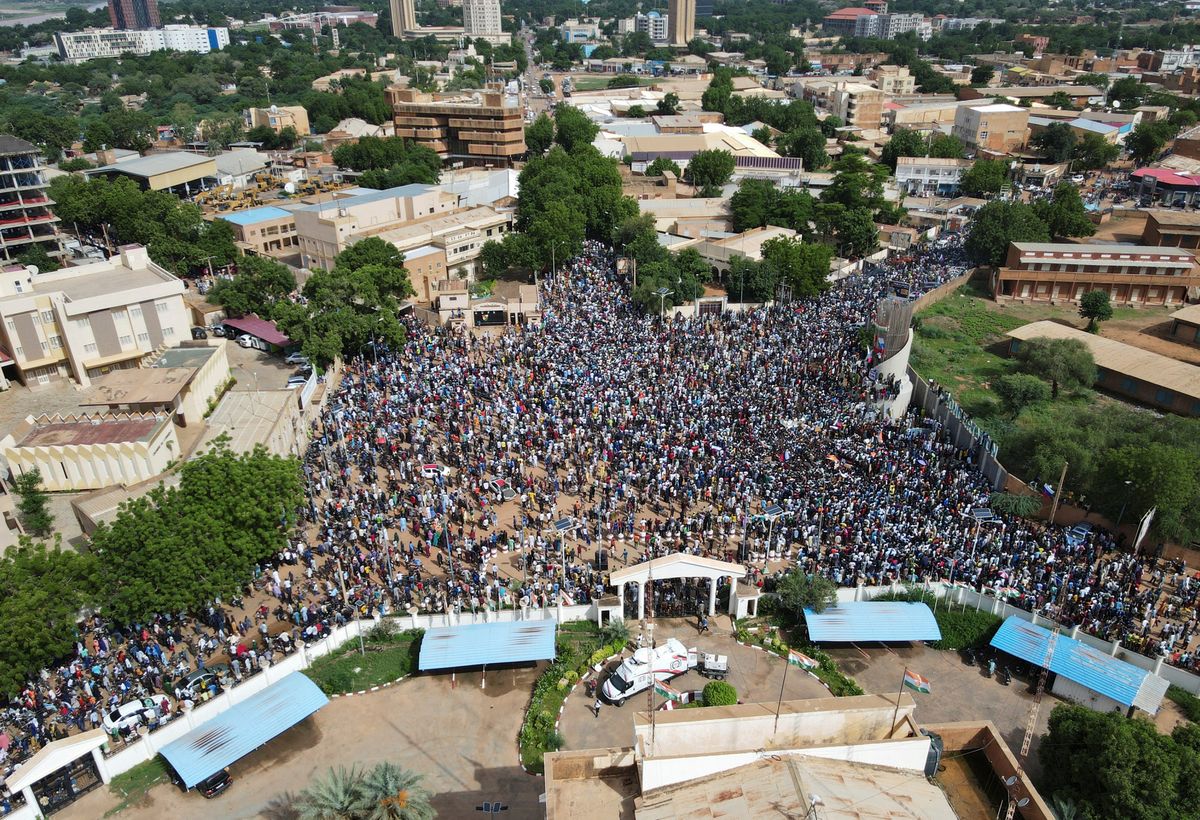What is going on with the Niger coup?
Last Wednesday, what looked like a fifth military coup began to develop in Niger, with soldiers of the presidential guard detaining President Bazoum.

A few minutes every morning is all you need.
Stay up to date on the world's Headlines and Human Stories. It's fun, it's factual, it's fluff-free.
The backstory: Niger is a country in West Africa that used to be a French colony. After getting independence in 1960, things have been rocky there, with it seeing four military coups between then and now. Other nearby countries, like Mali and Burkina Faso, have also been taken over by military coups in recent years.
While its economy hasn’t been doing great, there’s been a lot of support thrown behind Niger’s current President Mohamed Bazoum, who was elected in 2021. It’s also seen as a strong Western partner in fighting jihadists in Africa’s Sahel region. The US built and helps run an air base there, and France has about 1,500 troops in the country to work on joint operations with Nigeriens.
More recently: Last Wednesday, what looked like a fifth military coup began to develop in Niger, with soldiers of the presidential guard detaining Bazoum. On Friday, Gen. Abdourahmane Tchiani, the head of the presidential guard, named himself head of a transitional government dubbed “the National Council for the Safeguard of the Homeland.” But President Bazoum still hasn’t resigned from his post, and the international community is working to restore democracy there ASAP.
The African Union and the Economic Community of West African States (ECOWAS), the UN, the EU, the US and France have all condemned the coup. West African leaders and officials are working to put pressure on Tchiani and military forces to end the takeover. There’s not really a confirmed reason why the coup was triggered, but allegedly, Bazoum wanted to replace Tchiani, who was loyal to Niger’s former leader, as the head of the presidential guard, which was causing problems.
The development: The coup hasn’t been completely successful yet. On Saturday, Niger’s military leaders warned against any kind of military intervention from other countries. On Sunday, West African leaders met up in Nigeria's capital for an emergency summit to figure out what to do and how to get the military to restore the president and the country’s democracy. They decided to place economic and travel sanctions on Niger's new military leaders, and they threatened to get their militaries involved if the junta doesn’t reinstate President Bazoum within a week.
As all of this was happening, pro-junta supporters burned French flags and stoned the French embassy in Niger's capital Niamey, where police tried to control them with tear gas. Russia's Wagner group boss Yevgeny Prigozhin also came out in support of the coup and offered Wagner’s help to the junta.
Key comments:
"The objective of the (ECOWAS) meeting is to approve a plan of aggression against Niger through an imminent military intervention in Niamey in collaboration with other African countries that are non-members of ECOWAS, and certain western countries," junta spokesman Colonel Amadou Abdramane said on Saturday. "We want to once more remind ECOWAS or any other adventurer, of our firm determination to defend our homeland.”
“We couldn’t expect a coup in Niger because there’s no social, political or security situation that would justify that the military take the power,” said Professor Amad Hassane Boubacar, who teaches at the University of Niamey in Niger, to The Associated Press.
“Our economic and security partnership with Niger – which is significant, hundreds of millions of dollars – depends on the continuation of the democratic governance and constitutional order that has been disrupted by the actions in the last few days,” said US Secretary of State Antony Blinken. “So that assistance, that support, is in clear jeopardy as a result of these actions, which is another reason why they need to be immediately reversed.”
“Tensions with the military are still ongoing. There could be another coup after this one, or a stronger intervention from ECOWAS, potentially military force,” said Tatiana Smirnova, a researcher in conflict resolution and peace missions at the Centre FrancoPaix. “Many actors are also trying to negotiate, but the outcome is unclear.”




Comments ()